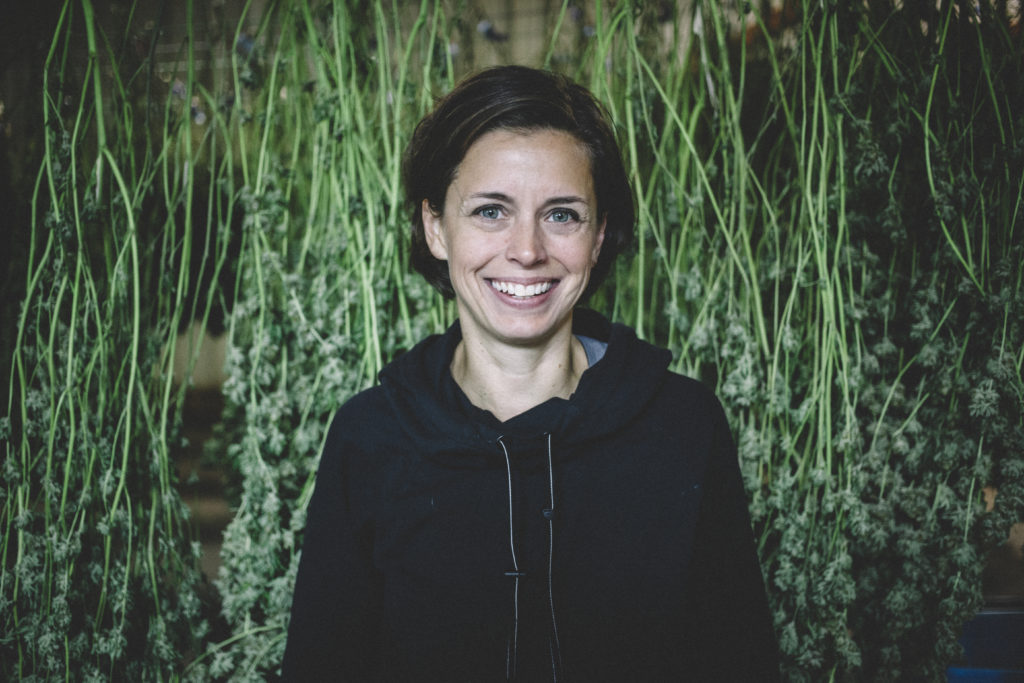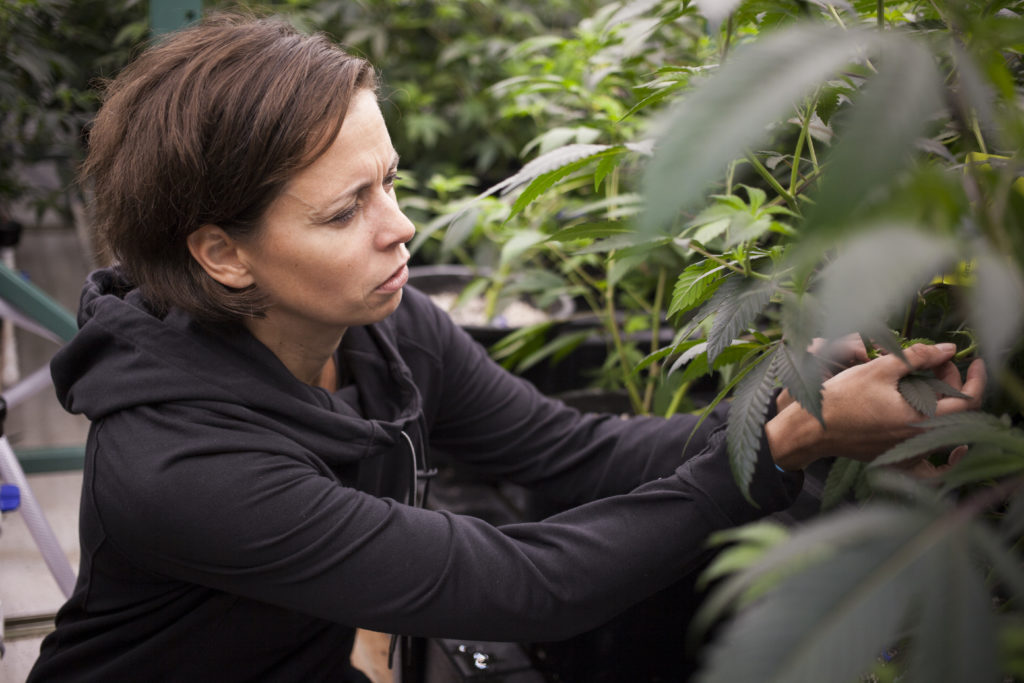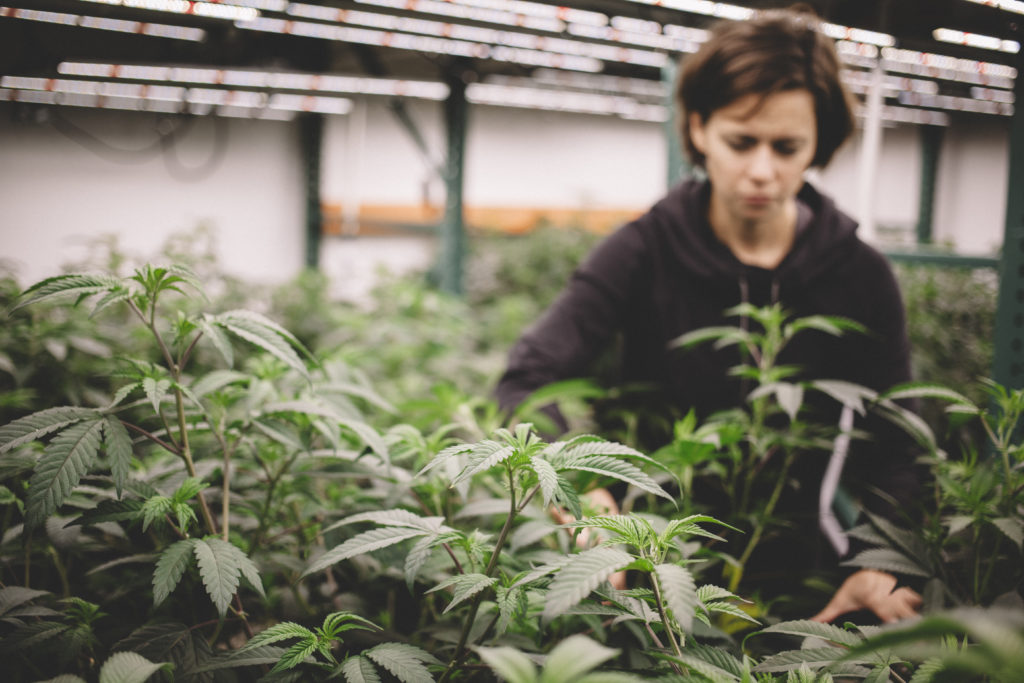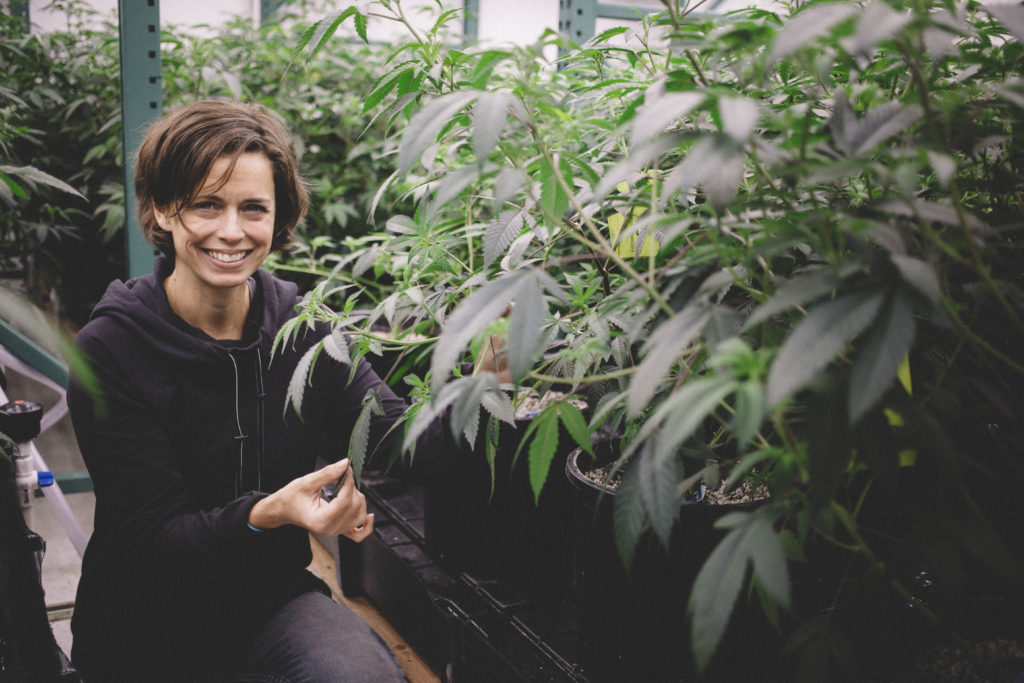
Kate Guptill is the Co-founder and Vice President of Operations and Finance at Eco Firma Farms in Oregon. As a distinguished female presence in the industry, Kate brings more than a decade of medical cannabis cultivation knowledge to the group. Prior to founding Eco Firma, Kate worked in finance for the Oregon Department of Justice and the Multnomah County District Attorney’s Office. She then moved on to start a finance consulting business offering accounting services to small private businesses in Portland. In addition to her executive roles at Eco Firma Farms, Kate continues to work intermittently as a cultivator. Keep reading to find out what she has to say about leaving the DOJ for cannabis, running a business with her spouse, and her advice for industry newbies.
What inspired you to leave the Oregon Department of Justice finance department for cannabis? I imagine there is a big difference in how the day-to-day operations of each job affect your life.
[Laughs]. Yes, definitely a little different on the day to day. The reality was, the company was just growing at such a pace that the time came to decide—do I want to stay at the DOJ, or fully invest my time into the company? The decision to make that career change was not an easy one, but one I’m happy I made. The day to day here at Eco Firma has such a diverse set of responsibilities, comparatively, that it’s really helped me grow as a business owner. I suspect it’s the same in many industries, but when it comes to owning a company, no owner has just one set of responsibilities. We have our specialties, but some days I’m the CEO, some the compliance officer, others the HR director. Like any start-up, if you are not prepared to be versatile, and resourceful with your needs, the days are going to get rough. Being a co-founder of this company has been the most stressful yet rewarding job I’ve had so far.

You co-founded Eco Firma Farms with your husband in 2012. What’s it like running a business with your spouse?
Wow, well, every day is great! We agree on everything, naturally. [Laughs]. Seriously, if we didn’t have such a long-standing relationship, I don’t know if we could have made it as a couple or a company. The divorce rate for couples that own companies together is 85-percent. We really had to put in a lot of hard work to find our way here, as a couple, and as business partners. There are so many lessons you learn along the way— when to have stressful conversations, how to communicate when venting to your spouse about your day vs. seeking answers to inner company issues, how to solve budget issues at the company and at home in the same conversation—the list goes on and on. Couple that with the fact that my spouse is a 23-year Marine, so his stubbornness is epic. Fortunately for him, we have been together for 25 years, so many of those Marine traits became my traits as well. As many military families know, you serve together, and the years of leadership, determination, integrity, those traits are instilled in the entire family thus, in the end, we really do complement each other’s skill sets really well. We have learned to take the lessons we’ve learned together and apply them to our business relationship. I’m proud of the strong leadership skills that women in this industry have displayed—when you can do that as a couple, I think you really have accomplished something unique.

Your website emphasizes environmental sustainability, and your farm runs entirely on wind power. Has it been difficult making the switch to more sustainable practices?
Surprisingly, not as much as you would think. Don’t get me wrong, there are definitely challenges, but once you get the ball rolling it snowballs quickly. The next thing you know, everyone is participating in ways you didn’t anticipate. The employees take pride in it. It becomes a competition—who can be greener? You begin seeing employees wash out their sandwich bags so they can reuse them, or find new ways to recycle used materials or containers rather than throwing them away. It’s a wonderful thing to see so many people take pride in an idea that feeds a desire to “be better, be the person my dog thinks I am.”
How long do you think it will take you to reach your goal of a carbon-neutral operation?
That’s a tough one. Carbon neutrality can easily become a rabbit hole. We have realized that we will have to take on some carbon offsetting credits to deal with the things we cannot control. However, the question is: what do we take responsibility for when considering true carbon neutrality? For example, the fuel the recycle truck uses to pick up our recycling containers, or fuel used by the delivery trucks to bring us materials. Who makes the materials we use? How green are they? In reality, we could just buy carbon offset credits for all of it and make the claim, but being carbon neutral is not about advertising and how it affects sales—it’s about changing the system and putting up a fight against the status quo of irresponsibility for profit.
What do you think dispensaries and customers should look for in a quality grower?
A woman, of course! Companies and consumers should look for integrity first—not just with cannabis, but with everything you buy. Eco Firma is not products, it’s people. The way a company treats their employees, the environment around them, the neighborhoods they work in, are all direct reflections of how they produce their products, and more to the point, how much they care about what they are actually providing the customer. Integrity is the base principal of our company. You don’t have to be perfect, we are far from it, but you have to care more about why you are doing something, than you do about what it is you’re doing.
What are some of the biggest challenges you’ve faced working in an industry that’s still illegal under federal law?
Banking, banking, banking. The access to capital all hinges around banking, and the options given to cannabis companies for financing without institutional banking are predatory at best. Of course, we all have grown accustomed to the day to day struggles over the years. Companies that will not work with you, price gouging, and of course the moral prejudice of those who do not support cannabis reform. For many outside the industry, these could seem small, simple problems to solve—the reality is, they are not. They are the short leash that has held all of us back. Throw in being a woman on top of that, and there are days that just make you want to pull your hair out.

What advice would you give aspiring cannabis entrepreneurs?
Look into opening a brewery! This industry is unforgiving and moves in dog years. We are literally writing the book, but with a chisel and stone while other industries have keyboards. Truly, if that advice doesn’t give you even one second thought, then I would say, be prepared to give this 110% everyday. Be prepared to work hard and have obstacles thrown at you constantly. Be strong, and don’t have one ounce of quit in you. Women are the strongest creatures in every species, be prepared to show that here.
What are some of the most popular strains you grow?
Hazy Girl. She’s a favorite around the farm and in the stores. Candyland, Golden Pineapple. Also, Lucid Dream–which will be back on shelves this summer.
What’s your favorite way to consume cannabis?
Pachecos. I know, it seems like a shameless plug, but it’s truly my current favorite. Probably because of the convenience… being that we make them and all.